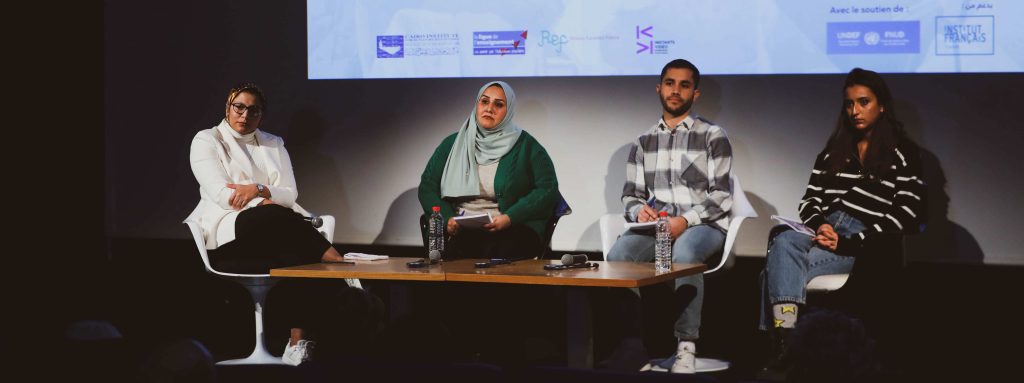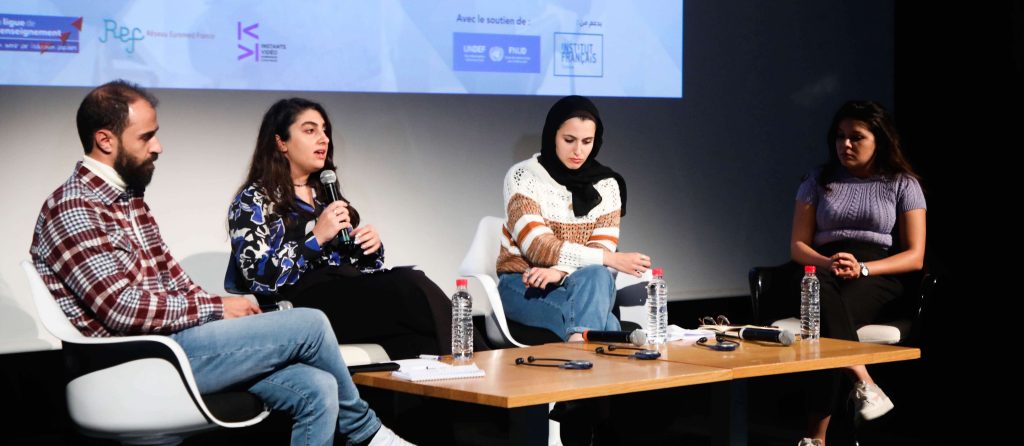Coinciding with International Human Rights Day, the Cairo Institute for Human Rights Studies (CIHRS) concluded its two-year training program Tamkeen, “Empowering a New Generation of Human Rights Defenders,” on 10 December 2022. Forty-four young human rights defenders from eleven countries (Tunisia, Egypt, Syria, Lebanon, Algeria, Morocco, Iraq, Palestine, Jordan, Libya, and Yemen) participated in the program.
Institut français de Tunisie hosted the closing event with partner organizations of the program: Réseau Euromed France (REF), Les Instants Vidéo Numériques et Poétiques (IV), and La Ligue de l’Enseignement – Fédération des Bouches-du-Rhône (AIL). The event featured the valuable `participation of Tunisian human rights activist and member of the Board of Directors of CIHRS, Bochra Belhaj Hmida, alongside an extensive presence of individuals and organizations concerned with human rights in Tunisia, as well as the program team, 28 participants, and a group of Tunisian journalists.
Lionel Briand, Director of Institut français de Tunisie, commenced the event by underscoring the importance of the Tamkeen program in discussing issues of human rights and equality in countries around the Mediterranean with a focus on the commitment of youth and new generations of civil society members in protecting and defending human rights. Marion Isvi, Executive Director of the Réseau Euromed France, emphasized the importance of solidarity, cooperation, and exchange of experiences among human rights defenders in the region. Isvi affirmed that the conclusion of the Tamkeen training program is tantamount to announcing the launch of many new human rights campaigns and initiatives, bringing together the participants of the program, with an anticipated continuation of the cooperative network between them.
In her intervention, Tunisian human rights defender Bochra Belhaj Hmida focused on the unprecedented deterioration in human rights in the region. Unprecedented restrictions on defenders of all genders have confiscated their most basic rights, including their right to free movement, while civil society and its members have been targeted by campaigns of repression, defamation, and incitement. This oppressive reality, Hmida added, “can only be negated by new generations of defenders, who renew hope for the continuation of the march and the defence and respect of peoples’ rights.” Addressing the new generations of human rights defenders, she affirmed, “Your presence, your campaigns, and your actions are what strengthen our steadfastness and renew our hope to achieve freedoms and rights.”
Through a short video produced by CIHRS, attendees explored the learning journey of the Tamkeen program and its five stages, beginning with the stage of basic human rights knowledge acquisition; passing through the stages of building trends, practice, application, and exchanging experiences, and ending with evaluation and follow-up. The video focuses on the outputs of the training program after 24 months, self-education, and participatory education, represented by the program’s participants from eleven countries in the region, who launched sixteen human rights campaigns.
Following the short video presentation, a two-part discussion began between the audience and the program members and participants. The first part of discussion focused on the restrictions imposed on women’s rights and the rights of the LGBTQ+ community in various countries of the region. These restrictions include legislation, discriminatory practices, social restrictions, and the prevailing patriarchal culture. In addition, women and members of the LGBTQ+ community face numerous forms of violence, including digital violence. Several valuable presentations and interventions were presented by human rights defenders from Lebanon, Palestine, Tunisia and Libya, throughout the first part of the discussion. The second part of the discussion focused on the repeated patterns of repression imposed on freedom of traditional and digital expression and media freedoms; these repressive practices include blocking websites and closing newspapers, and extend to targeting journalists and content creators with threats, imprisonment, torture, and enforced disappearance, in most countries of the region. The discussion also focused on the extent to which ordinary citizens are punished for simply expressing their opinions on social media, based on laws with broad terms such as ‘anti-cybercrime’ and ‘anti-terrorism’ laws. Participants came to understand the similarity between the practices and patterns of repression in different countries patterns, after listening to interventions from Egypt, Palestine, Iraq, Morocco, Tunisia, and Libya, which granted them access to a broader picture of the deteriorating human rights situation in the Arab region as a whole.
The event concluded with a short video of the participants’ most important impressions from the learning journey of the ‘Tamkeen’ program. Program participants were honored with certificates of appreciation for their efforts and the human rights campaigns they launched.
Share this Post


